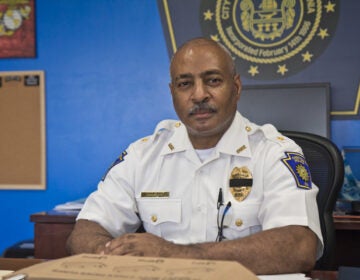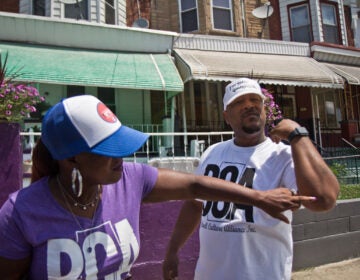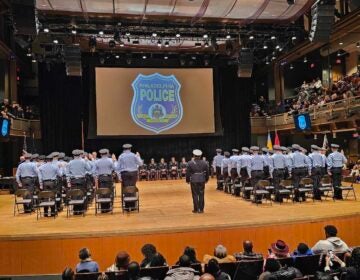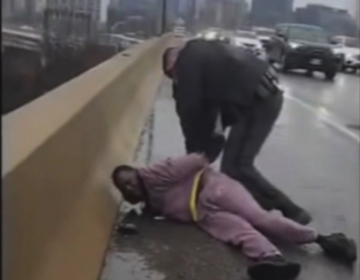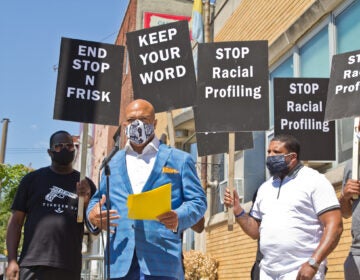Black leaders call on Philadelphia police to end stop and frisk — again
As police continue to stop and frisk Black Americans at higher rates than whites in the city, Black groups renewed demands that Mayor Kenney end the law enforcement tactic.
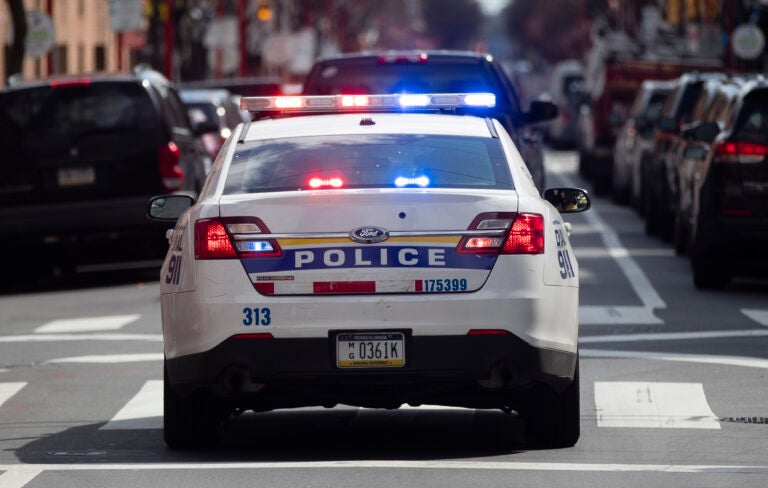
A Philadelphia Police Department cruiser is pictured in this file photo. (AP Photo/Matt Rourke)
This article originally appeared on The Philadelphia Tribune.
—
As police continue to stop and frisk African Americans at higher rates than whites in the city, Black groups renewed demands that Mayor Jim Kenney end the law enforcement practice.
A collection of Black community organizations have signed a letter calling for Kenney to ban the tactic as he has supported other police reforms in the wake of the police killing of George Floyd in Minneapolis and subsequent protests.
Police have used the tactic for decades to “violate the civil and human rights of Black people” in Philadelphia, according to the groups’ letter. The groups noted that Kenney pledged to end stop and frisk when he ran for his first term as mayor in 2015.
“There is no doubt that harsh practices such as chokeholds and other asphyxiation tactics must be banned from police policies, but we believe that the best way to prevent police brutality is by limiting needless contact with police in the first place,” the groups wrote in the letter.
The groups plan to hold a rally to end stop and frisk at 11 a.m. July 14 at the 26th Police District Headquarters in the Fishtown neighborhood. They plan to deliver their letter to Kenney that day, too.
The groups also called for more police training and the formation of a community oversight committee. The organizations that signed onto the letter include the Human Rights Coalition 215, Unity in the Community, and Frontline Dads.
Mike Dunn, a spokesman for the Kenney administration, said in an email the mayor remained “fully committed to eliminating unconstitutional stops” and noted all major U.S. cities employ the practice.
The city’s police department has put in place a series of changes in recent years to reduce unconstitutional stops, including new procedures, additional training, a more comprehensive review process by supervisors, and additional accountability measures, Dunn said.
Since Kenney took office in 2016, police stops have dropped from 139,441 to 76,937 in 2019, Dunn said.
“This administration has made tremendous strides in reducing unconstitutional pedestrian stops, and we are committed to continuing that,” Dunn said.
Dunn also noted the mayor has supported a series of police reforms, including the formation of a police oversight commission that would have subpoena power. Residents will weigh in on whether to create such an oversight commission through a referendum on the November ballot.
A police department spokesman declined to comment in an email on Monday.
But Police Commissioner Danielle Outlaw has advocated for the use of stop and frisk in the past.
At a June budget hearing, Outlaw said that “stop and frisk is a tool made available to us,” adding that training was needed to ensure police use the tactic legally.
“Tools are important and I don’t believe that we throw the baby out with the bathwater,” the commissioner said at the time.
The renewed calls to end stop and frisk come after the 10th report from the American Civil Liberties Union of Pennsylvania on the Philadelphia Police Department’s use of stop and frisk.
The report, released in April, found troubling racial disparities.
The report found Black people made up 70% of the stops, far outpacing African Americans’ share of the city’s population (44%), according to data focused on a sample size of stops from the latter half of 2019. Whites made up 22% of stops and Latinos made up 8% — both coming in below their percentage of the city’s population at 35% and 14%, respectively.
As for police frisks, Black people made up 80% of them, while whites accounted for 12% and Latinos 8%, according to the report.
The report also found that few guns were seized as a result of the tactic; quality of life issues accounted for many of the stops; and officers failed to provide reasonable suspicion in a “significant number of cases.”
The ACLU called on the police department to re-evaluate its use of the tactic.
“In light of the very low hit rate for weapons and the fact that stops and frisks generate strong negative community relations (and continue to be highly racially disparate), the Police Department should as a matter of policy to re-assess the cost/benefit of this policing program,” according to the report.
Police conducted 485 frisks, of which 38% were illegal, according to the report, an uptick from 21% in 2018. Overall frisks declined to 12.5% of all stops, according to the data, down from 16% in the previous report.
The ACLU called on more action from city officials to reign in the police department’s use of stop and frisk. The ACLU also continued to assert the police department was not reporting all frisks.
“These data demand far more robust measures by the City to ensure that frisks are made only with reasonable suspicion that the suspect is armed and dangerous,” according to the report.
Dunn pushed back against the ACLU’s claim that police were not reporting all frisks.
“There is little evidence to support that this is happening in Philadelphia,” Dunn said. “If presented with such evidence, we would be sure to investigate, as we have done in the past when incidents have been brought to our attention.”
The police’s use of stop and frisk continued to result in getting fewer drugs and guns off the street and resulted in an arrest 13% of the time.
Only 30 guns were seized out of 3,995 stops analyzed in the sample size, a hit-rate of 0.8%, and drugs were found in 110 of the stops (2.7%).
As for frisks, police seized 7 firearms out of 485 frisks (1.4%) and “non-drug contraband” was found in 43 of the frisks (8.8%).
The ACLU’s report stems from a 2011 consent decree between the city and ACLU of Pennsylvania.
Will Mega, the co-founder of the Human Rights Coalition 215 who signed onto the letter calling on Kenney to end stop and frisk, said the ACLU’s updated report reflected “more of the same: Over-policing of Black communities.”
“It is an ongoing trend of Black people as being treated as second-class citizens,” he said. “And it speaks to the mayor not being a man of his word by carrying out his [2015] campaign promise to end stop and frisk.”
Mega said the ongoing national protests over the police killing of Floyd and police brutality has not only brought attention to police reforms but united community organizations in Philadelphia on these issues.
“We intend to keep the pressure on,” Mega said, “until there is some change.”

Get daily updates from WHYY News!
WHYY is your source for fact-based, in-depth journalism and information. As a nonprofit organization, we rely on financial support from readers like you. Please give today.


